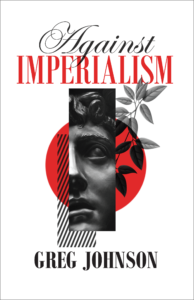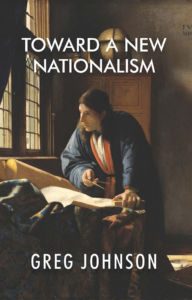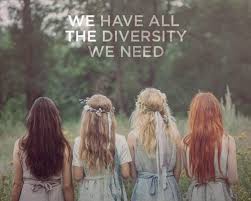In Defense of Ethnonationalism
Posted By Greg Johnson On In North American New Right | 9 CommentsThis is a response to Asier Abadroa’s “Is Ethnonationalism Compatible with Genetic Interests in Practice? [2]” His answer is, on balance, no. He argues that ethnonationalism is often connected with romantic ideas about faraway oppressed peoples that are not based on fact, that peoplehood is hard to define, that ethnonationalism is often connected to bad ideas such as chauvinism and Marxism, that it creates needless enmity among whites and specious amity toward non-whites, that White Nationalists should not support ethnonationalism because it isn’t all that popular, that having separate homelands is not necessary to preserve cultural diversity, and that cultural differences are no big thing anyway because their existence is historically contingent. I largely disagree.
The first argument, that support for ethnonationalism often depends on romantic ideas about faraway oppressed peoples, seems to leave out something important. It abstracts entirely from the point of view of the peoples who are fighting for independence. But their perspective should be primary.
I am sure that Americans had all sorts of misty, romantic, uninformed attitudes about Ireland under British rule. But what about the Irish? The Irish really were an oppressed people. Although the Irish and the English are genetically very similar, they are two different peoples. The English took and held Ireland by force. Their presence was hateful to the Irish. The Irish were willing to kill and die for their sovereignty. That’s all the argument I need for ethnonationalism.
The idea that ethnicity is hard to define, and therefore ethnonationalism is somehow specious, also depends on giving primacy to an outside perspective. I don’t know how to define Irishness, Basqueness, or Norwegianness. I doubt that the natives do, either. But we all know more than we can say. I can’t define “blue,” but I know it when I see it. I can’t define “cabbage,” but I never confuse it with lettuce. The idea that you don’t know something, or that things don’t even exist, if you can’t define them is an old sophism. In this context, it is more often used by the Left. “What do you mean by ‘English’? Angles, Saxons, Jutes?” The nice thing about sovereignty is that peoples get to define themselves.
The claim that ethnonationalism is often associated with unsavory ideas such as Marxism and chauvinism toward other white groups is true but irrelevant.
White Nationalism as I define it advocates the right of all European peoples to ethnostates — sovereign, ethnically defined homelands — if they aspire to self-determination. There are four elements of this definition that need to be spelled out.
First, your rights are not obligations. A right is simply an option that you can choose to exercise or not. The obligation pertains to others, who are obliged to get out of your way. The right to have a homeland is not, therefore, an obligation to have one. Some peoples may be content within multiethnic states. If they are, they are not obliged to change anything. However, if they aren’t happy — if they believe that independence is necessary for them to maintain their identity and way of life — then they have the right to exit and create their own homeland, and everybody else is obligated to get out of their way.
Second, this is a form of ethnonationalism: meaning that the most natural locus of sovereignty is an ethnic group, which is defined by shared blood, history, language, and culture. Ethnically homogeneous states are superior to ethnically diverse ones because with greater diversity, both genetic and cultural, comes greater disharmony. Any traveler knows how stressful it is to be in a country where you do not speak the language. Imagine living like that all the time. That’s life in a multiethnic society.
Third, the right of self-determination is universal, meaning that it is shared by all peoples. This eliminates the bad old nationalism in which nations pursue their interests at the expense of other nations. If the right to self-determination is universal, that means that we must leave other peoples free. If we wish to deal with them, we must persuade them. That means offering them something of value for whatever we want from them. It means cultivating amity and commerce, not enmity and war.
 [3]
[3]You can buy Greg Johnson’s Against Imperialism here [4].
Fourth, by defining myself as a White Nationalist I am speaking from a sense of white racial solidarity that needs to supervene upon more particular white ethnic nationalisms.
In sum, I advocate: ethnonationalism + universalism + white solidarity. The right to self-determination for white peoples means ethnonationalism. Universal nationalism means that one ethnostate should not infringe upon the rights of another. White Nationalism means solidarity with other white nations and a preference for them over non-whites.
Why speak of “white” nationalism at all? Why not speak only of more particular ethnic nationalisms? Because that leaves something out. First, all European peoples share a common racial descent, and with kinship comes responsibilities. White peoples should give preferences to one another over non-whites. Second, all European peoples face the same threats to our survival — low fertility, miscegenation, replacement migration — thus we should work together whenever possible to solve these problems. Third, one of the principal threats to white genetic interests is “civic” nationalism: the idea that non-whites can become members of white nations simply by being granted citizenship. But whiteness is a necessary condition of belonging to any European people. Not all white people are Irish, but all Irish people are white. Fourth, assimilation is a real thing, although it is rare and difficult and should only be allowed in small numbers. Race sets the outermost boundaries of assimilation. An Irishman can become an American, but a Nigerian simply can’t. Finally, we need to talk about “white” nationalism just because whites are being attacked as whites by our enemies, not as Germans or Swedes or Poles. Of course none of us are merely white. We all belong to particular ethnic groups. But over and above that, we are also white, and White Nationalism does justice to that.
Then why not speak simply of White Nationalism, without reference to any particular ethnic nationalisms? Why not simply say “Our Race Is Our Nation”?
The problem with this approach can be appreciated by asking what this means in concrete political terms. The only thing that White-Nationalism-Not-Ethnonationalism can mean politically is: One White State on the principle “One people (white people), one state.”
If White-Nationalism-Not-Ethnonationalism doesn’t mean One White State, then it means many white states. But what if some of those states happen to be ethnostates? Is that a bad thing? Why would White Nationalists, of all people, have a prejudice against ethnically homogeneous states as opposed to ethnically diverse ones? Is diversity suddenly a strength?
Why is One White State a bad idea for white people? Because white people may be one race, but we are not one nation. We are many nations, some of which intensely hate one another, indeed some of which are currently at war. White people are linguistically, culturally, historically, i.e. ethnically diverse. We have tried multiethnic white states before. The record is not good. Many white peoples living under the same government breeds conflict, hatred, even violence just as surely as many different races living under the same government.
The only way to reduce conflict is to reduce diversity. There are two basic ways to do this. First, different peoples can go their separate ways, setting up their own homogeneous states where they can govern themselves. That’s the ethnonationalist solution. Second, one people can try to assimilate the others, which is to say, culturally destroy them, to produce one homogeneous people for one state. That’s the imperialist solution. Of course the very attempt to forcibly culturally assimilate other white peoples is a major cause of ethnic conflict to begin with. (There’s an obvious difference between empires that forcibly assimilate subject peoples and societies that demand that immigrants assimilate as a condition of voluntary entry.)
The specific form of ethnonationalism I advocate is: ethnonationalism + universalism + white solidarity. But I am also willing to cheer on less optimal forms of ethnonationalism, even petty, chauvinistic, and Left-wing ethnonationalisms, especially if they take the form of separatist movements trying to break up multiethnic states.
First, if these movements succeed, they will help the best kind of ethnonationalists, since we can point to them as recent historical examples of white peoples peaceably and voluntarily going their separate ways.
Second, I wish to resist globalism in every possible way. Globalism pulls everything toward the center. Thus I cheer everything that resists and reverses globalism’s centripetal pull. I cheered for the United Kingdom’s Brexit from the European Union and for Scottish independence from the UK. I would also cheer for Catalonia leaving Spain and Flanders leaving Belgium.
I regard every blow against globalism as a win for the forces of identity and rootedness. Naturally, I would like these newly-independent nations to have sensible governments. But it is still a win even if, like the UK after Brexit, they end up being governed by globalists, anyway.
Why? Take Brexit, for example. Brexit was hugely draining and demoralizing to globalists. Brexit forced them to expend enormous resources to keep Britain in the EU, and when Brexit won, the globalists in the UK had to expend enormous resources to eviscerate it and to reduplicate EU operations locally. All those resources could have been spent advancing the globalist agenda instead.
Thus, I want globalists in every multiethnic state to face ethnic secessionist movements. I want the United States to face regional and state secessionist movements as well. I want globalism to die the death of a thousand cuts.
Many White Nationalists find this position startling. The general objection is: “Do you really want to Balkanize white nations into impotent little statelets?” Yes, I do.
First, “Balkanize” should not be a dirty word among nationalists. It was coined by those who opposed the breakup of the Ottoman and Austro-Hungarian empires on ethnonationalist lines. That simply sounds like justice to me. The Balkan peoples are better off with ethnically homogeneous homelands. The more homogeneous the homeland (Slovenia, Croatia), the happier the people.
Second, as for reducing the power of multiethnic states, this objection literally assumes diversity is a strength. Or, more to the point, it assumes that a state is stronger if it can deploy more people and resources to its tasks, regardless of their ethnicity, regardless of whether they want to work for its ends. It looks upon people as raw materials, even as potential slaves, since their assent presumably doesn’t matter. If England’s elites get into a war, they want access to Irish, Scottish, and Welsh bodies. They’d be weaker without them. Politicians actually think this way. I submit that White Nationalists should not.
Beyond that, these aren’t “our” states. Almost all white nations today are in the hands of hostile elites. So yes, I am fine with taking power away from these elites by stripping them of subject peoples and their resources. And as I have argued above, breaking up multiethnic states is still a win for us even if these “impotent statelets” end up in the hands of local globalists.
Abadroa writes: “We do not need more useless fragmentation in the face of the hegemonic Judaic imperialist superpower(s).” But that’s the wrong way to look at it. “We” are not being fragmented, since we have no states. It is the “hegemonic Judaic imperialist superpower(s)” that are fragmented by secessionist movements.
 [5]
[5]You can buy Greg Johnson’s Toward a New Nationalism here [6].
Nationalists today are cowering in foxholes under the artillery barrage of modern states and globalist institutions such as the EU. The first order of business should be to destroy the instruments raining death upon us. This is why I cheer on all anti-state trends, including secessionism.
But there are nationalists who oppose anything that would dismantle modern states because instead of confronting the reality of our dispossession, they believe that in some sense these states are still “ours.” Instead of taking practical steps to dismantle the institutions that oppress us, they prefer to daydream about what they would do if they had control over a modern state (in which case, they think, “The bigger, the better”). There is a strong strand of power-worship on the Right: states can never be too large, too centralized, or too powerful, no matter who controls them. For some nationalists, our enemies can never have too much power to use against us. This strikes me as mad.
We don’t want a strong state unless it is our state. We will never have our state until the current system loses its ability to suppress and contain us. Thus, under those conditions, I am tactically anti-state. Ethnic nationalism is one of the most powerful forces undermining the current system. Thus, White Nationalists should cheer on even suboptimal forms of ethnonationalism in the present circumstances. (I should not have to point out that this does not imply that we approve of everything that has been done by the bad old nationalists of yesteryear.)
Abadroa’s most important argument is that ethnonationalism threatens white genetic interests by fostering unnecessary hatred between whites. It can even lead to alliances with non-whites against whites, such as Germany’s alliance with Japan.
. . . ethnonationalism attempts, by its very Cainite nature, to oppose the interests of the white race. As nice as it is in theory, in practice it translates into hatred for those peoples that are the most similar, and inculcates xenophilia and preference for the most different and distant.
In what way? Since it is a fact that hatred of others achieves greater mobilization and a better electoral performance than love for one’s own (and this is true of any ideology), the electoral dynamic itself necessarily pushes ethnonationalism — and especially independence movements — to turn one’s neighboring people, or the majority people in any multi-ethnic state, into enemy number one. Thus, since disputes usually arise with one’s surrounding peoples, and since greater geographic proximity is usually correlated with greater genetic proximity, we find that ethnonationalism most often makes a supreme enemy out of precisely those peoples who are most similar to one’s own, rather than those most different and incompatible.
First, I will grant that if two white peoples are locked in conflict, that is not good for the white race as a whole. So where do these conflicts come from, and how do we solve them? The conflicts come from the existence of different white ethnic groups under the same government. Short of genocide, we can’t do anything about the existence of different white ethnic groups. But we can do something about them existing under the same government. In short, multi-ethnic states are the principal cause of ethnic conflicts, and ethnonationalism is the solution. As for whites allying with non-whites against fellow whites: ethnonationalism removes the temptation by removing the conflicts.
Abadroa seems to posit that generic white people naturally got along with one another until ethnonationalists came along to artificially divide them. This strikes me as analogous to the Marxist criticism of nationalism: proletarians around the world naturally had common interests until they were divided artificially by nationalism.
In both cases, this is based on a misunderstanding. Both the white race and the proletariat exist objectively. But that is a far cry from being political realities, meaning political agents. Sam Francis was fond of saying that the white race exists objectively but not subjectively, meaning that most white people lack racial consciousness. Racial consciousness, however, is a necessary condition of white collective political agency, just as class consciousness is a necessary condition of proletarian political agency. But neither racial consciousness or racial political agency exist outside of tiny White Nationalist groups.
The political realities we must start with are ethnic groups and states, some of which coincide with ethnic groups. In my debate with Gregory Hood, “One White State or Many [7]” and “Reply to Gregory Hood [8],” I explain why grassroots White Nationalist movements will inevitably take an ethnonationalist form and why denigrating such movements in favor of One White State is a self-defeating strategy.
The argument that it is foolish for White Nationalists to cheer on ethnonationalist movements because they are unpopular leaves me cold. White Nationalism is currently unpopular as well. Both ideas should be more popular. Our goal is to make them more popular.
Is ethnic separatism unpopular for good reasons? Elderly Scotsmen voted against an independent Scotland because they were afraid for their pensions. Many Europeans are content to lose their sovereignty and identities in exchange for easier shopping: one currency and no borders. Frankly, the preferences of deracinated Last Men should not matter to us.
The argument that cultural diversity is not necessarily threatened by multi-ethnic states or ensured by political autonomy is surely correct. The Romansch people of Switzerland, for instance, have not had any serious agitation for independence since the nineteenth century. But this is beside the point. All I maintain is that, in cases where peoples feel that their identity is threatened by living in multiethnic orders, they shouldn’t have to fight their way out.
As for the claim that we shouldn’t try to preserve cultural differences because cultures arise contingently and change over time, this argument applies to the white race as well. But if races and cultures were eternal and indestructible, nothing could threaten their existence anyway. Contingency and change are precisely why we must act to preserve things of value. A sovereign homeland remains the best way to preserve white peoples, and the white race will be saved one white nation at a time.
